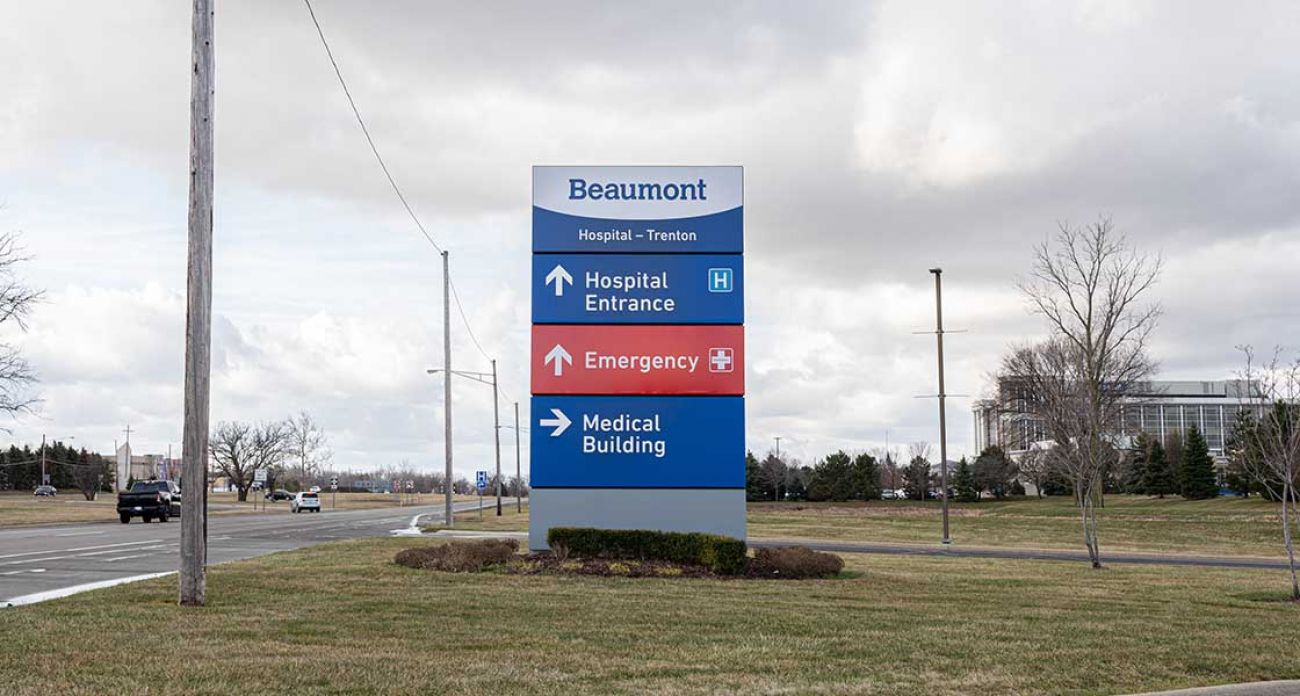Beaumont to lay off 2,475, eliminate 450 Michigan jobs due to coronavirus

Beaumont Health’s CEO John Fox is blaming the system’s pivot to coronavirus care, which canceled surgeries and skyrocketed equipment costs, for the layoffs of 2,475 employees and elimination of 450 jobs.
“Unfortunately it's a tale of two cities if you will in that [we have] absolutely outstanding performance by our clinical teams, whom I cannot be more proud of … But the other piece of that — by doing the most, we're also hemorrhaging the most in terms of cash,” Fox said during a Tuesday morning call with reporters.

The Southfield-based health system is the largest in Michigan, with 38,000 employees. Last week, it reported $54 million in losses in the first quarter, in large part because of canceled surgeries and office visits and the shift to COVID-19 care.
“We can't sustain it by keeping this large group on the payroll the way we have been up to this point. So we have to make some tough decisions,” Fox said.
Fox presented charts showing Beaumont cared for more COVID-19 patients than other hospitals in southeast Michigan, a discrepancy that he called a “lesson learned.”
He said other, unnamed hospitals didn’t want to take on patients, echoing his earlier criticisms of the state and other health systems for not sharing data on bed availability during the peak of the crisis.
“In another pandemic, it's gotta be all hands on deck. Everybody's got to be willing to help,” he said.
How long the cuts will last, and whether they’re enough, is unclear.
“We're still walking around in a dark room of a pandemic with unprecedented size and proportion,” Fox said.
“This virus only exists to go from human to human, and we don't know how that will behave. So, the uncertainty of the future for us is significant.”

In announcing the layoffs, Beaumont announced Fox will take a 70 percent temporary pay cut and other executives will take pay cuts up to 45 percent. Fox’s total compensation was about $5.7 million in 2017, according to the Detroit Free Press.
Speaking to reporters, Fox repeatedly declined to release his base salary.
“I don't have any bonuses coming in nor does any other executive. … I'm not gonna go down the rabbit hole of individual salaries, including mine. I think we've been clear on the percentage and it's quite real,” Fox said.
LIke other hospitals and health systems, Beaumont canceled money-making, non-emergency procedures as the pandemic swept toward Michigan. Some “time-sensitive” surgeries have begun, such as cancer surgeries, Fox said.
At the same time, though, emergency visits have dried up as patients avoid health care settings for fear of COVID-19. And even as cash flow dwindled, costs have skyrocketed as health providers scrambled for scarce personal protective equipment.
“While we used to pay $1 for a gown maybe six weeks ago, it is now $6 a gown, and we're trying to get it from all different sources. The supply chain definitely was not ready for a pandemic, and that has impacted us significantly,” Fox said.
“Varied” help from other hospitals
Fox also presented a chart indicating Beaumont provided COVID-19 care and testing for more than 25,000 patients, while some other providers had fewer than 3,000.
During the first weekend in April, two Beaumont hospitals — Farmington Hills and Grosse Pointe — were suddenly “90 percent COVID-19,” he said.
Farmington “just got slammed with COVID-19 patients in the ER. The ER waiting room was jammed. There was a line going out the building and went across the street. The patients were waiting in their cars in the first level of a parking garage,” Fox said.
Some patients were taken to other Beaumont hospitals, a process called “load balancing.”
“But we also asked a lot of others to do that,” Fox said. “We had different reactions. Some were trying to preserve PPE; others didn't want any potential COVID-19 patients,” he said, declining to name the hospitals.
The reluctance by some hospitals to take patients wasn’t driven by economics, but concerns that infected patients could create a “disease vector” that would overwhelm staffs and supplies, said Brian Peters, CEO of the Michigan Health & Hospital Association.
“This was not a competitive issue,” Peters said. “In our view, it was more a concern … [of Michigan] hospital and health system leaders looking at what happened in New York City, looking at what happened in Seattle, and now closer to home … in Detroit and thinking, ‘I really don't know. Next week, that could be me,’” he said.
Hospitals will recoup some of the lost money through the Coronavirus Aid, Relief and Economic Security Act, or CARES Act. In Michigan, they will split about $468 million, but the allocations have drawn criticisms because they are based on providers’ past Medicare reimbursements rather than the extent they were impacted by COVID-19 care.
Peters said he and others through the American Hospital Association have lobbied for the next round of funds to be weighted toward hospitals that provided the most COVID-19 care.
Merger on hold
Fox was among the first to raise concerns about health care finances amid COVID-19, calling for a $300 billion to $600 billion federal Hospital System Super Fund.
Other hospitals both large and small also have announced furloughs or layoffs in recent days, including Detroit Medical Center and McLaren.
Henry Ford Health System has declined to offer details, confirming only that it, too, faces budget woes.
"There is no question that the COVID-19 pandemic is having a major economic impact on our health system and we are continuing to assess the full effects as this crisis evolves,” spokesperson Brenda Craig wrote in an email Tuesday.
Beaumont also has put on hold, but not canceled, a merger with Akron-based hospital system Summa Health, one of Ohio’s largest hospital systems.
The not-for-profit Summa employs about 7,000 people and includes a network of four hospitals with a total of 1,300 licensed inpatient beds.
“We can't turn a blind eye to the pandemic,” Fox said, calling the merger “an unnecessary distraction given that we are working seven days a week, 16 hours a day, to deal with the pandemic and so is Summa.”
“It's kind of like you had a plan to do something but the house is now on fire so we're going to deal with the fire.”
Beaumont said it also will cancel some nonessential projects.
Suddenly out of work
Non-unionized employees who are temporarily laid off can continue to participate in their Beaumont health insurance and other benefits at their current employee rates during the layoff.
They also can apply for enhanced unemployment benefits and may be called back to work. That includes employees at Beaumont’s Wayne campus, which was recently placed on standby — its patients and staff rerouted — in case of a coronavirus resurgence.
But Fox also put unionized employees on notice, saying their contracts would not allow the system to extend to them the same health care benefits while they’re out of work.
About 5 percent of Beaumont’s staff is unionized, he said.
“If they would like the same arrangement the other 95 percent have — that means everything — I think we can look at that and probably do it,” Fox said.
“But we can't allow a situation where they start to cherry pick with respect to whether we want this or not that, because that's just not fair.”
He did not elaborate.
Those whose jobs are eliminated will receive a lump-sum severance package and are eligible to continue their benefits at current employee rates through their severance period. They also can apply for other open positions at Beaumont and be given priority, according to Beaumont.
Kevin Lignell, a spokesperson for SEIU Michigan, said he was not surprised to learn the latest round of layoffs comes with diminished benefits for unionized workers.
“This has been classic Beaumont for a long time,” said Lignell, whose union represents about 300 Beaumont cleaners, dietary staff and other support workers who were laid off when the hospital system closed its Wayne hospital.
“They’ve been anti-union for as long as I know and they’re going to try to divide and conquer the staff in as many ways as possible.”
Beth Jacobs, a postpartum and gynecological nurse at Beaumont Royal Oak who has been redeployed to care for COVID-19 patients in recent weeks, had expected to spend her day off Tuesday relaxing with her family.
Instead, the 32-year-old nurse said, “my heart is racing” as she waits by the phone.
Jacobs, who is among nurses who have been working to organize a union at Beaumont Royal Oak, said she worries her union activities will make her a target for a layoff.
She took Fox’s comments about health care coverage for non-unionized employees as a strategic comment intended to “instill fear” in nurses who have participated in the union drive.
“I think that’s a message to all of the nurses, saying that forming a union would be a disadvantage for you,” said Jacobs.
She said she worries the layoffs will force remaining staff to shoulder a greater share of the system’s COVID-19 overload, and they are already very busy.
“At the end of the day, how is this going to affect our patients?” she asked.
RESOURCES:
- Hey, Michigan, here’s how to make a face mask to fight coronavirus
- Michigan coronavirus dashboard: cases, deaths and maps
- Michigan families can get food, cash, internet during coronavirus crisis
- How to give blood in Michigan during the coronavirus crisis
- 10 ways you can help Michigan hospital workers right now
- Michigan coronavirus Q&A: Reader questions answered
- How to apply for Michigan unemployment benefits amid coronavirus crisis
See what new members are saying about why they donated to Bridge Michigan:
- “In order for this information to be accurate and unbiased it must be underwritten by its readers, not by special interests.” - Larry S.
- “Not many other media sources report on the topics Bridge does.” - Susan B.
- “Your journalism is outstanding and rare these days.” - Mark S.
If you want to ensure the future of nonpartisan, nonprofit Michigan journalism, please become a member today. You, too, will be asked why you donated and maybe we'll feature your quote next time!








